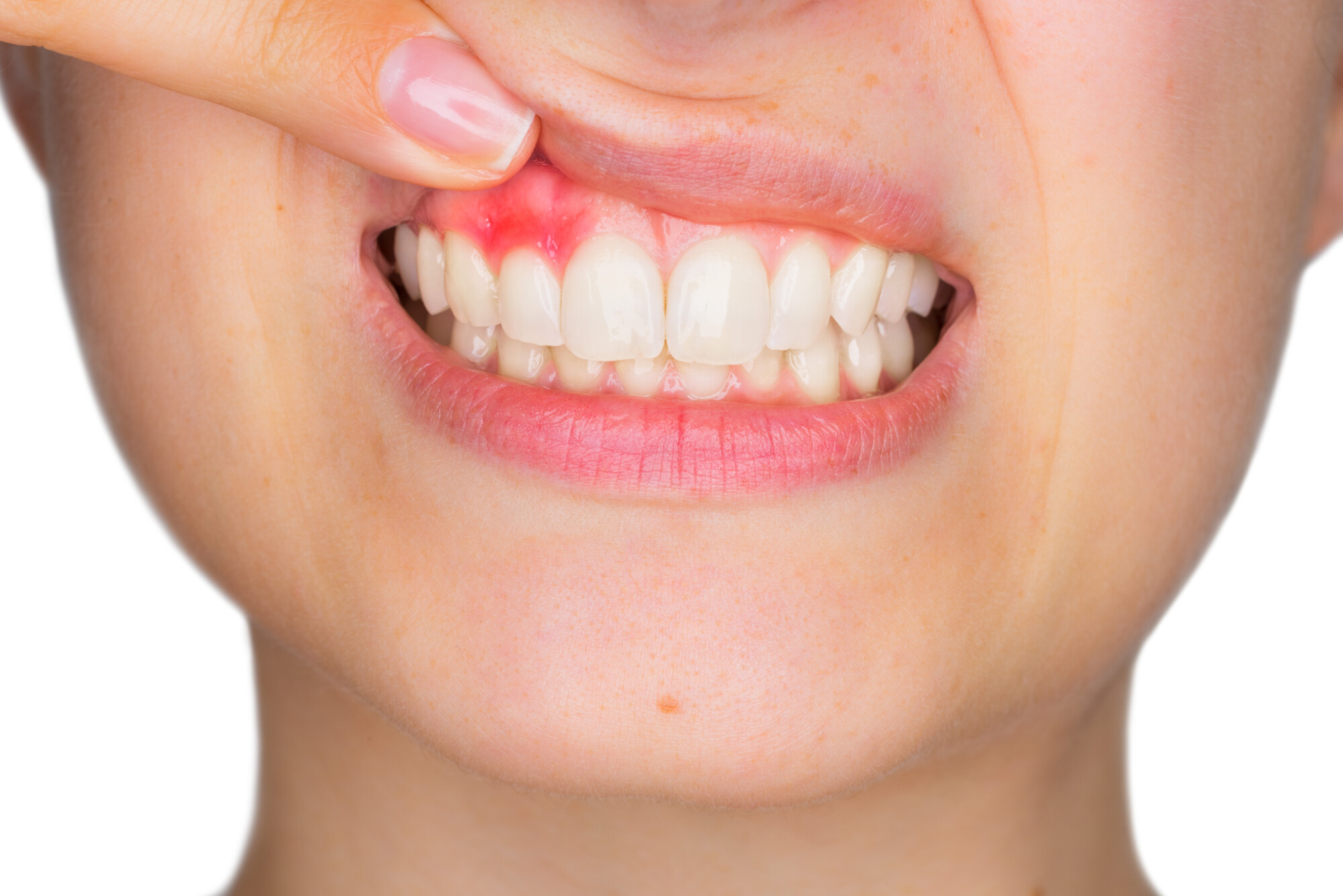
Closeup portrait of young woman showing, with his finger, inflamed upper gingiva with pain expression. Dental care and toothache.
If there’s one thing worse than having to walk in drenched socks, it’s bleeding gums. The truth is that bleeding gums are a common occurrence and not a reason to panic. In fact, it’s one of the main reasons people visit their dentists.
Keep reading to learn about the seven reasons gums bleed and how to prevent bleeding gums.
What Causes Bleeding Gums?
The reasons you have bleeding gums can range from a minor problem to something indicative of a severe health issue. Of course, depending on the reason, you can prevent bleeding gums by thorough oral hygiene and routine dental checkups.
1. Medication
If you have bleeding gums, of the first things to check is any medication you may be taking. Oftentimes, blood-thinning medicines are the root cause of bleeding gums.
That’s because these medications significantly decrease your body’s ability to clot blood, which leads to excess bleeding.
It’s best to let your physician know right away if you experience bleeding gums while on these types of medications. But you may be asking yourself, “do I need oral surgery?”
In most cases, the answer is no. Loop in your dentist during your routine appointments about the medicine, but it’s best to contact your physician right away if the bleeding becomes severe.
2. Gingivitis
One of the most common causes of bleeding gums is gingivitis. It’s a mild form of periodontal disease that causes inflammation, redness and swelling.
Although mild, it’s a disease that must be taken seriously and treated immediately. If left untreated, it can lead to periodontitis and eventually tooth loss.
A majority of gingivitis cases come from poor oral hygiene and dental health. The good news is that you can prevent this disease and even reverse it in some cases by brushing twice a day, getting regular checkups and flossing every day.
3. Vigorous Brushing
One would think that brushing harder would result in a cleaner mouth and better oral health. However, the reality is that vigorous brushing can cause harm to your gums and tooth enamel.
Instead, you can use a soft-bristle toothbrush and gently brush your teeth for a longer duration. This is especially important if your gums are already bleeding. Do not stop brushing or flossing. Keep up the habit but switch to a softer brush that’s easier on your gums.
4. Pregnancy
Oftentimes, pregnant women will experience swollen and tender gums that bleed when flossing or brushing. This is normal and occurs due to hormonal changes and the body’s reaction to bacteria.
5. Blame Your Diet
Processed foods aren’t the best for your body, and the first point of contact is your mouth. Some ingredients in processed foods can cause irritation and bleeding.
It’s best to avoid any processed foods and instead have a balanced diet. That means a diet full of vegetables and fruits rich in magnesium, calcium and vitamins A, C and K.
6. Dental Routine Changes
Bleeding gums can be from something as simple as a change in your dental routine. For example, infrequent flossers will generally experience bleeding gums when flossing.
More often than not, the bleeding will clear up with regular care within a week. If not, it may be indicative of something more severe like gingivitis and time to book your next dental appointment.
Additionally, firm toothbrushes can cause bleeding gums. Consider asking your dentist if you should use a soft or medium bristle toothbrush at your next appointment.
7. Your Oral Appliance Doesn’t Fit
Another common cause of bleeding gums is wearing a denture that fits incorrectly. An improper fit can lead to the dentures scratching and irritating your gums.
This can lead to sores and frequent bleeding gums. If you wear dentures, you must brush twice daily and clean your dentures to prevent plaque buildup.
Bonus: Health Issues
Certain medical issues can cause bleeding gums. For example, diabetes is a leading disease that causes bleeding gums.
This is because diabetes changes the body’s pH and how it metabolizes certain foods like fats, sugars and starches.
These changes lead to flourishing bacteria, which ultimately causes gums to bleed and weakened enamel. Other medical issues include leukemia, scurvy, blood disorders and vitamin deficiencies.
Preventing Bleeding Gums
The first and easiest way to prevent bleeding gums is with adequate brushing and healthy oral hygiene.
The key to adequate brushing is timing and movement.
You want to brush for at least two minutes and use short, smooth movements. Additionally, it pays to clean your tongue to prevent bacteria accumulation and growth.
The second way to prevent bleeding gums is by avoiding sugary drinks and food, alcohol and cigarettes.
Sugary drinks, food and alcohol promote bacterial growth and cause teeth enamel to weaken, while cigarettes cause irritation and inflammation to the gums.
You can also prevent bleeding gums by having a balanced diet and paying regular visits to your dentist.
A balanced diet doesn’t mean getting fruit servings from popsicles containing only two percent real fruit juice. What you want is a balanced diet rich in vitamin C, calcium, vitamin K and iron.
These are the most important nutrients you can ingest to help promote oral health.
The last method is more of a preventative measure, and that’s to pay regular visits to your dentist. Regular visits should include at least two deep cleanings every year.
Deep cleaning is important because it removes dirt and plaque in hard-to-reach places. Additionally, by paying regular visits to your dentist, they can conduct a review of your oral health and identify diseases early on.
No Need to Bleed
If you experience prolonged bleeding gums, consider finding the best dentist in your area for bleeding gums treatments as well as paying a visit to your physician.
Did you find this blog useful? Check out some of our other recent posts!
Leave a Reply